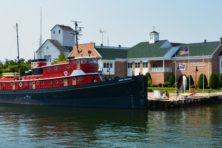Review: ‘The Merry Wives of Windsor’
- Share
- Tweet
- Pin
- Share
During the reign of the first Queen Elizabeth, William Shakespeare entertained his compatriots with a series of plays about the history of England, including two plays dealing with the sad life and troubled times of King Henry IV.
In the process, he created probably the greatest comic character in English literature, Sir John Falstaff, also known as “the fat knight.” Falstaff drinks too much, spends too much, eats far too much, lies incessantly, shows courage only when it serves his purpose and attempts to fill his chronically empty purse by resorting to highway robbery.
He rarely worries about his future, however, because he has ingratiated himself – or so he thinks – with Prince Hal, the heir to the English throne. In short, Falstaff is a scoundrel who belongs in jail, yet he is witty, clever, convivial, full of mirth and good cheer, educated to a degree, and, on occasion, he reveals the wisdom and dignity that one would expect of a noble knight. Audiences love him.
Some say that Queen Elizabeth enjoyed Falstaff’s antics so much that she asked Shakespeare to write a third play about him – “and this time, show him in love.” We have no way of knowing whether this story is true, but Shakespeare did write that third play: The Merry Wives of Windsor.
Scholars have not cared much for it, but composers have taken it to their hearts – both Giuseppe Verdi and Otto Nicolai wrote operas based on it – and playgoers find it hilarious. Those who want to judge for themselves may attend Door Shakespeare’s The Merry Wives of Windsor this summer at the troupe’s outdoor theater at Björklunden.
As the play opens, Falstaff is not so much “in love” as flat broke. He has run out of friends who will lend him money, so he devises a plot: He will court the attractive wives of two prosperous townsmen, Ford and Page. He assumes that both women will happily fall into his arms and gladly support him using their husbands’ money.
What he doesn’t know is that Mistresses Ford and Page are best friends who confide everything to each other. When they receive identical love letters from Falstaff, they are disgusted and immediately decide to take revenge. A complication is that although Page is a calm and sensible man, Ford is given to fits of jealousy.
The Door Shakespeare production is great fun. Before the show opens, several cast members take the stage to sing merrily about the charms of Windsor village: “Whenever you’re in Windsor, you’re at home!” But the singers also hint that there might be “dirty laundry” in this wonderful place (and there is – literally).
Then, after a somewhat slow opening scene, Falstaff makes his entrance, and the various plots begin to unfold. At a key moment, Falstaff hides himself in an enormous laundry basket, only to have servants dump him into the River Thames, along with the soiled and reeking clothes.
The Door Shakespeare cast is excellent, and Matt Daniels’ portrayal of Ford is outstanding: he throws conniptions of feverish and twitching jealousy when he suspects that his wife is having an affair with Falstaff.
In a particularly funny scene, Ford rummages hysterically through the laundry basket, convinced that Falstaff has hidden inside for a second time. Wildly he flings pieces of underwear into the air, then disappears inside the basket itself, only to emerge moments later with a stricken expression on his face and a piece of dirty laundry dangling from around his head.
Allie Babich as Mistress Ford is both charming and slinky when she pretends to be infatuated with Falstaff, and Carrie Hitchcock gives an excellent, quirky performance as Mistress Quickly.
But no production of Merry Wives can succeed without a good Falstaff, and Mark Corkins is up to the task. He has the resounding voice and impressive demeanor necessary to portray the fat knight in all his rascally splendor, and he commands the audience’s attention from the moment he walks on stage.
His Falstaff even manages a shivery, self-pitying dignity after he has dragged himself out of the Thames: “I have a kind of alacrity in sinking,” he declaims mournfully. He is waterlogged but not defeated, and when a second chance at Mistress Ford seems to present itself, Falstaff is immediately ready for the chase.
Fans of Door Shakespeare should not miss this show. Performances take place at Björklunden, 8097 Boynton Lane in Baileys Harbor. For a complete schedule and tickets, call 920.839.1500 or visit doorshakespeare.com.
This review is based on the June 19 preview performance of The Merry Wives of Windsor.


